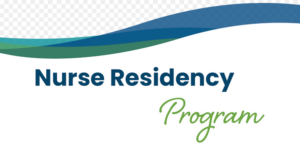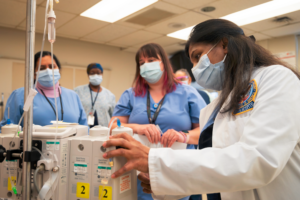Nurse Residencies with Lots of Job Opportunities for New Grad
 Nurse residency programs are valuable opportunities designed for new graduate nurses to transition from their academic education to hands-on work in hospitals and healthcare settings.
Nurse residency programs are valuable opportunities designed for new graduate nurses to transition from their academic education to hands-on work in hospitals and healthcare settings.
These programs are highly competitive but offer great job experience, training, and professional development.
Research shows that around 30% of new graduate nurses quit their jobs within the first year, and 57% leave by the end of the second year.
Nurse residency programs can help reduce these numbers by offering critical support and guidance to help new nurses succeed in their roles.
Nurse Residency Programs: A Path to Success for New Graduate Nurses
In this guide, we’ll explore nurse residency opportunities for new graduate nurses, including programs for both ADN (Associate Degree in Nursing) and BSN (Bachelor of Science in Nursing) nurses. We’ll also cover the benefits, requirements, and application process of these programs, as well as accreditation and leadership development features that make some programs stand out.

Struggling to meet your deadline?
Get your assignment on Nurse Residencies with Lots of Job Opportunities for New Grad done by certified MDs and PhDs in the USA. ORDER NOW!
How Do Nurse Residency Programs Work?
 Nurse residency programs are typically designed for new graduate nurses with little to no professional experience. These programs, which last between 6 to 12 months, provide a structured learning environment where nurses receive training in three key areas:
Nurse residency programs are typically designed for new graduate nurses with little to no professional experience. These programs, which last between 6 to 12 months, provide a structured learning environment where nurses receive training in three key areas:
- Becoming better at their job: Practical, on-the-job training that builds nursing skills and knowledge.
- Helping patients more effectively: Focus on improving patient care and communication skills.
- Being a leader in nursing: Development of leadership and professional decision-making skills, which are essential for advancing in the nursing field.
Nurse residency programs also offer additional learning opportunities such as classroom education, hands-on practice with mentors, simulated medical scenarios, and workshops on time management, problem-solving, and hospital policies. These programs are essential for new graduate nurses as they help smooth the transition from nursing school to actual clinical practice, improving both their confidence and competence. 
What Are the Benefits of Nurse Residency Programs?
Nurse residency programs offer a range of benefits for new graduate nurses, including:
- Support and Mentorship: New nurses receive guidance from experienced mentors, which helps ease the transition into professional nursing roles.
- Improved Job Satisfaction: Nurses who participate in residency programs often report higher levels of job satisfaction and better outcomes in patient care.
- Higher Retention Rates: Studies show that nurse residency programs can help increase nurse retention rates, keeping nurses in the workforce longer.
- Career Advancement: Many residency programs provide leadership development opportunities, preparing nurses for future roles in management or specialized fields.
What to Look For in a Nurse Residency Program
When choosing a nurse residency program, there are several factors to consider:
- What Degree Do You Need? Some nurse residency programs are open to both ADN and BSN graduates, while others may require a BSN. Be sure to check the program’s requirements for education level.
- Program Accreditation: Accreditation ensures the program meets high educational standards. Look for accredited nurse residency programs, as these are recognized for providing quality education and training.
- Program Requirements and Eligibility: Most programs are designed for new graduate nurses with less than a year of experience. Some programs may have specific eligibility criteria, such as the need for a BSN or certain GPA requirements.
- Location and Availability: Some nurse residency programs are offered in multiple locations across different states, while others may be more regional. Consider where the program is available and whether it aligns with your preferred work location.
- Leadership Development Opportunities: Some nurse residency programs include components focused on leadership development to help new nurses grow in their roles as team leaders or managers. These programs can help you advance in your career faster.
- Cohort and Start Dates: Many programs run on a cohort system, where new graduates start the program together. This can be a great opportunity to build a support network with fellow new nurses.
- Easy Entry and Application Process: Some programs have an easy entry process and may accept all new graduate nurses, while others may be more competitive. Understand the application process and deadlines for each program you are interested in.

Top Nurse Residency Programs by State
Here are some of the best nurse residency programs available for new graduate nurses, whether you have an ADN or a BSN:
- Penn State Health (Pennsylvania)
- Degree Requirements: ADN
- Experience: No paid nursing experience required
- Locations: Four locations across Pennsylvania
- Units: 12 units
- Automatic Entry: Yes
- BJC Health (St. Louis, Missouri)
- Degree Requirements: BSN (preferred)
- Experience: No paid nursing experience required
- Locations: 11 locations
- Units: 11 units
- Automatic Entry: Yes
- Jefferson Health (Pennsylvania/New Jersey)
- Degree Requirements: BSN (preferred)
- Experience: No paid nursing experience required
- Locations: 10 locations
- Units: Must complete the program to work
- Automatic Entry: Yes
- Luminus Health (Maryland)
- Degree Requirements: ADN
- Experience: No paid nursing experience required
- Locations: Two locations
- Units: Flexible based on job offer
- Automatic Entry: Yes
- North Memorial Health (Minnesota)
- Degree Requirements: ADN
- Experience: No paid nursing experience required
- Locations: Robbinsdale, MN
- Units: Various learning units and meetings
- Automatic Entry: Yes
- Western Missouri Medical Center (Missouri)
- Degree Requirements: ADN
- Experience: No paid nursing experience required
- Locations: Warrensburg, MO
- Units: 1 unit
- Automatic Entry: Yes
- Tower Health (Pennsylvania)
- Degree Requirements: ADN
- Experience: No paid nursing experience required
- Locations: Three locations
- Units: Varies by position
- Automatic Entry: Yes
How to Apply for a Nurse Residency Program
 The nurse residency application process can vary from program to program, but typically it includes submitting an online application, providing transcripts, and meeting any specific eligibility criteria. Be sure to check the program’s website for application deadlines and other requirements.
The nurse residency application process can vary from program to program, but typically it includes submitting an online application, providing transcripts, and meeting any specific eligibility criteria. Be sure to check the program’s website for application deadlines and other requirements.
Nurse residency programs are an excellent way for new graduate nurses to gain the skills, knowledge, and confidence they need to succeed in the nursing profession. Whether you’re looking for nurse residency programs for ADN nurses or BSN nurses, you’ll find various opportunities across the country.
These programs offer structured learning, mentorship, and leadership development, all of which help set new nurses up for long-term success. Be sure to research the top nurse residency programs in your state, and find one that aligns with your career goals and educational background.
By participating in an accredited nurse residency program, you’ll be better prepared to navigate the challenges of healthcare and make a meaningful impact on patient care, while enhancing your professional development and career prospects.
Top 7 Programs for New Nurses With Less Than One Year of Paid Experience
Nurse residency programs are a great way for new graduate nurses with less than one year of experience to transition smoothly from school to the workforce. These programs offer hands-on training, mentorship, and professional development in a supportive environment. Here’s a look at seven of the top nurse residency programs for new nurses with less than 12 months of paid experience, along with details about their locations, benefits, and application requirements.
1. Sentara Healthcare
Location: Norfolk, Virginia (12 locations across North Carolina and Virginia)
Minimum Degree: ADN
Experience: Less than 12 months of nursing experience
Units: Nurses can apply to any unit they would like to work in
Automatic Entry: Yes
Sentara Healthcare’s nurse residency program is a 12-month program designed for new graduate nurses with less than one year of experience. The program includes monthly four-hour seminars focusing on leadership, patient outcomes, and professional roles. Nurses are matched with units based on their preferences, making it a flexible option for new nurses.
2. University of Maryland Medical System
Location: Maryland (Nine locations)
Minimum Degree: ADN
Experience: Less than one year of acute care experience
Units: Open to any available position
Automatic Entry: Yes
New nurses at University of Maryland Medical System must complete the nurse residency program before advancing to clinical nurse II positions. The program includes monthly cohort sessions and one-on-one unit orientation, which help new nurses build leadership and clinical skills necessary for career growth.

3. Sanford Health
Location: Sioux Falls, South Dakota (Six locations across South Dakota, North Dakota, and Minnesota)
Minimum Degree: ADN
Experience: Less than 12 months of nursing experience
Units: 22 units available
Automatic Entry: Yes
Sanford Health’s nurse residency program is designed for new graduate nurses with less than one year of paid experience. The program includes 12 monthly seminars covering topics like evidence-based practice, clinical reflection, and self-care. Nurses are paid to attend these seminars while working at one of Sanford’s many locations.
4. Willis-Knighton Health System
Location: Louisiana (Four locations)
Minimum Degree: ADN
Experience: Less than one year of nursing experience
Units: New nurses can be placed in any open unit
Automatic Entry: Yes
The Willis-Knighton Health System offers a nurse residency program for new nurses with less than one year of experience. This program provides support through preceptor and mentor relationships, focusing on leadership, professionalism, and improving patient outcomes. Nurses are automatically enrolled when they accept a position at any of Willis-Knighton’s four locations.
5. Saint Joseph Health System
Location: Indiana (Five locations)
Minimum Degree: ADN
Experience: Less than one year of acute care experience
Units: Open to all positions within the system
Automatic Entry: Yes
Saint Joseph Health System offers a 10-month nurse residency program for new graduate nurses. This program focuses on professional development, leadership, clinical reasoning, and patient outcomes. Nurses complete an evidence-based project as part of the residency, which enhances their clinical decision-making skills. The program is open to new nurses hired at any of the five participating locations.
6. Yale New Haven Health
Location: Connecticut and Rhode Island (Five locations)
Minimum Degree: ADN
Experience: Less than one year of acute care experience
Units: Seven units available
Automatic Entry: Yes
Yale New Haven Health provides a nurse residency program for new nurses with less than one year of acute care experience. This program includes monthly seminars and opportunities to develop clinical and leadership skills in a supportive cohort environment. Nurses are placed at one of Yale’s five participating locations across Connecticut and Rhode Island.
7. Tampa General Hospital
Location: Tampa, Florida (One location)
Minimum Degree: ADN
Experience: Less than one year of acute care experience
Units: Open to all new clinical nurse positions
Automatic Entry: Yes
Tampa General Hospital’s nurse residency program is specifically designed for new graduate nurses with less than one year of acute care experience. The program includes small group sessions, monthly seminars, and mentorship. This program helps foster professional development, leadership skills, and networking opportunities for new nurses.
Nurse Residency Program Opportunities by State
Nurses considering relocating for better career opportunities may want to explore states with a high number of nurse residency programs. States like New York, Pennsylvania, Texas, Maryland, and Virginia have a large number of hospitals offering accredited nurse residency programs. These locations provide more job satisfaction, competitive salaries, and opportunities for career advancement, helping nurses to build their skills and prepare for leadership roles in healthcare.
How to Apply to Nurse Residency Programs
To apply for a nurse residency program, it is important to be prepared. Many programs require applicants to apply around six months in advance of the start date. Application materials typically include:
- A current resume
- A valid CPR certification
- An unofficial transcript with your cumulative GPA
- A clinical narrative (a written statement of your nursing practice)
The clinical narrative usually involves describing your care for a specific patient, highlighting your clinical skills. Some programs may also require certification for specialized areas, such as critical care or cardiovascular nursing.
Nurse residency programs are generally open to new graduate nurses who have passed the NCLEX and have less than 12 months of paid nursing experience. Some programs accept nurses with up to six months of experience, while others may accept nursing students who are about to graduate.
 Frequently Asked Questions About Nurse Residencies
Frequently Asked Questions About Nurse Residencies
Are nurse residency programs required?
No, nurse residency programs are not required, but they are highly recommended as they help improve clinical skills, ease the transition from school to clinical work, and increase job satisfaction.
How do nursing residencies work?
Residency programs usually involve classroom learning, clinical simulations, and mentorship. New nurses gradually work with greater autonomy as they develop their skills and gain confidence.
How can I prepare for a nurse residency?
To prepare, familiarize yourself with the program at your hospital, organize any required materials, and develop effective stress-management strategies to succeed in the program.
How long are you considered a new grad nurse?
Typically, you are considered a new grad nurse if you have less than 12 months of experience. Some programs may allow up to six months of work experience before you are no longer eligible.
Methodology and Limitations
The rankings of the top nurse residency programs for new graduates were determined using data from the AACN and hospital websites accessed in October 2022. The rankings are based on factors such as automatic entry, the maximum amount of experience allowed, the degree requirements, and the number of cohorts and units available.
While these rankings offer valuable insights, applicants should verify specific details directly with the hospital or health system to ensure they have the most up-to-date and accurate information before applying.
These nurse residency programs are a fantastic way to kick-start a successful career in nursing, offering leadership development, clinical training, and mentorship. By participating in one of these programs, new graduate nurses will have the opportunity to improve their clinical skills, gain valuable experience, and work towards a fulfilling and rewarding career in healthcare.

Dont wait until the last minute.
Provide your requirements and let our native nursing writers deliver your assignments ASAP.

